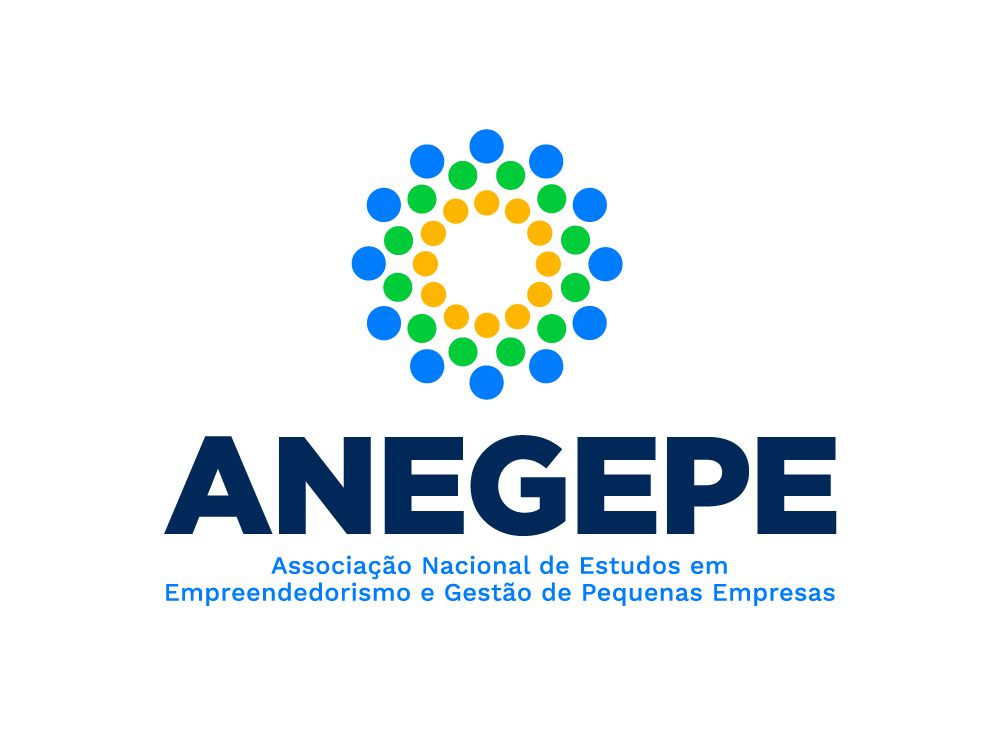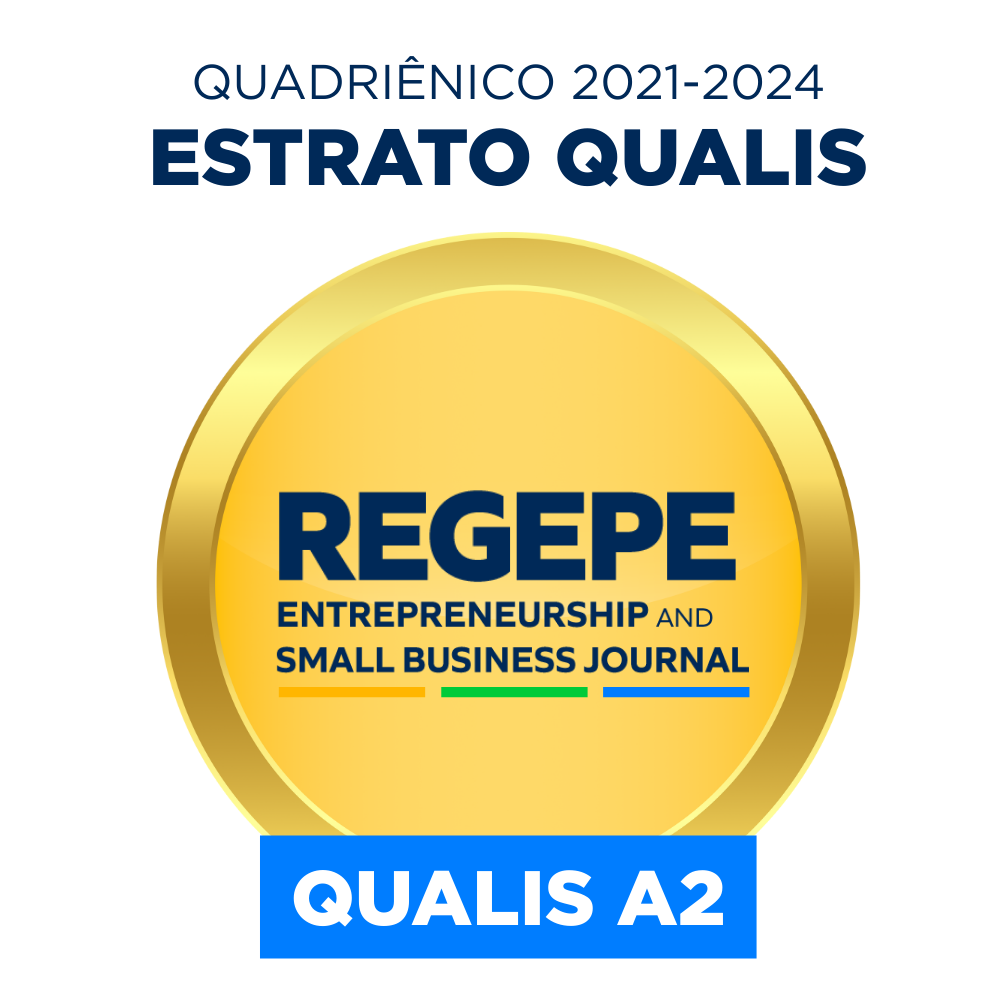Missão empreendedora das universidades na abordagem das Capacidades Dinâmicas: Um estudo multicasos no sul do Brasil
DOI:
10.14211/regepe.esbj.e2164Palavras-chave:
Escritórios de transferência de tecnologia universitários, Capacidades dinâmicas, Missão empreendedora da universidadeResumo
Objetivos do estudo: Com o objetivo de compreender como universidades do sul do Brasil tem desenvolvido sua missão empreendedora, este estudo analisar o papel de seus escritórios de transferência de tecnologia (TTOs) pelas lentes da teoria das capacidades dinâmicas, considerando-se as práticas de sensing, seizing e transforming. Metodologia: abordagem qualitativa e estratégia de estudo de casos múltiplos contendo 31 entrevistas semi-estruturadas foram realizadas com diferentes atores ligados aos escritórios de transferência de tecnologia , além de pesquisa documental. Principais resultados: O estudo revelou que as práticas de sensing, seizing e transforming tem sido adotadas pelos escritórios de transferência de tecnologia das universidades e estão servindo de suporte para que elas enfrentem um novo cenário em que a educação superior é representada por demandas empreendedoras e inovadoras. Contribuições teóricas: reside no debate de como universidades do Brasil estão gerenciando estrategicamente suas práticas a fim de se adaptar a uma nova era na educação por meio de capacidades dinâmicas. Relevância/ Originalidade: Esta pesquisa oferece um processo de análise que incluiu microfundamentos das capacidades dinâmicas e sua importância para o desenvolvimento e avanço da terceira missão das universidades, contribuindo para a originalidade do estudo. Contribuições para a gestão: oferecer uma visão nova de modelos e práticas para que outras universidades, que vem buscando operar em uma dimensão empreendedora, possam se beneficiar.
Downloads
Referências
Anderson, R. M., Heesterbeek, H., Klinkenberg, D., & Hollingsworth, T. D. (2020). How will country-based mitigation measures influence the course of the COVID-19 epidemic? The Lancet, 395(10228), 931-934. https://doi.org/10.1016/S0140-6736(20)30567-5
Abreu, M., Demirel, P., Grinevich, V., & Karataş-Özkan, M. (2016). Entrepreneurial practices in research-intensive and teaching-led universities. Small Business Economics, 47(3), 695–717. https://doi.org/10.1007/s11187-016-9754-5
Baycan, T., & Arkali Olcay, G. (2021). Linking the Performance of Entrepreneurial Universities to Technoparks and University Characteristics in Turkey. Region, 8(1), 97–117. https://doi.org/10.18335/region.v8i1.300
Bellucci, A., & Pennacchio, L. (2016). University knowledge and firm innovation: evidence from European countries. The Journal of Technology Transfer, 41(4), 730–752. https://doi.org/10.1007/s10961-015-9408-9
Bergmann, H., Geissler, M., Hundt, C., & Grave, B. (2018). The climate for entrepreneurship at higher education institutions. Research Policy, 47(4), 700–716. https://doi.org/10.1016/J.RESPOL.2018.01.018
Bezanilla, M. J., García-Olalla, A., Paños-Castro, J., & Arruti, A. (2020). Developing the entrepreneurial university: Factors of influence. Sustainability (Switzerland), 12(3). https://doi.org/10.3390/su12030842
Brescia, F., Colombo, G., & Landoni, P. (2016) Organizational structures of Knowledge Transfer Offices: an analysis of the world???s top-ranked universities. Journal of Technology Transfer, v. 41, n. 1. https://doi.org/10.1007/s10961-014-9384-5
Benneworth, P., Pinheiro, R., & Sánchez-Barrioluengo, M. (2016). One size does not fit all! New perspectives on the university in the social knowledge economy. Science and Public Policy, 43(6), 731–735. https://doi.org/10.1093/scipol/scw018
Compagnucci, L., & Spigarelli, F. (2020). The Third Mission of the university: A systematic literature review on potentials and constraints. Technological Forecasting and Social Change, 161, 120284. https://doi.org/https://doi.org/10.1016/j.techfore.2020.120284
Dalmarco, G., Hulsink W., & Blois, G. V. Creating entrepreneurial universities in an emerging economy: Evidence from Brazil. Technological forecasting and social change, 135, 99-111. https://doi.org/10.1016/j.techfore.2018.04.015
Denti, L., & Hemlin, S. (2012). Leadership and innovation in organizations: A systematic review of factors that mediate or moderate the relationship. International Journdalal of Innovation Management, 16(3), 1–20. https://doi.org/10.1142/S1363919612400075
Desidério, P. H. M., & Zilber, M. A. (2014). Barreiras no processo de transferência tecnológica entre agências de inovação e empresas: observações em universidades públicas e privadas. Revista Gestão & Tecnologia, 14(2), 99-124. http://dx.doi.org/10.20397/2177-6652/2014.v14i2.650
Dornbusch, F., & Neuhäusler, P. (2015). Composition of inventor teams and technological progress – The role of collaboration between academia and industry. Research Policy, 44(7), 1360–1375. https://doi.org/https://doi.org/10.1016/j.respol.2015.04.003
Eisenhardt, K. M. (1989). Building Theories from Case Study Research. Academic Management Review, 14(4), 532–550. https://doi.org/10.2307/258557
Etzkowitz, H., Webster, A. & Healey, P. (Eds.). (1998). Capitalizing Knowledge. New Intersections of Industry and Academia. New York, NY: State University of New Press, pp. 1-17.
Etzkowitz, H., & Leydesdorff, L. (1998). A Triple Helix of University—Industry—Government Relations: Introduction. Industry and Higher Education, 12(4), 197–201. https://doi.org/10.1177/095042229801200402
Etzkowitz, H. (2002). MIT and the Rise of Entrepreneurial Science. (T. & F. E-Library, Ed.). New York: Guedes.
Etzkowitz, H., Webster, A., Gebhardt, C., & Cantisano Terra, B. R. (2000). The future of the university and the university of the future: evolution of ivory tower to entrepreneurial paradigm. Research Policy, 29, 313–330.
Fini, R., Rasmussen, E., Siegel, D. S., & Wiklund, J. (2018). Re-thinking the commercialization of public science: from entrepreneurial outcomes to societal impacts. Academy of Management Perspectives, 6(6), 1–25. https://doi.org/10.5465/amp.2017.0206
Gallardo, F. O., & Navarro, J. R. (2003). A model of strategic change: Universities and dynamic capabilities. Higher Education Policy, 16(2), 199–212. https://doi.org/10.1057/palgrave.hep.8300016
Giuri, P. et al. 2019. The strategic orientation of universities in knowledge transfer activities. Technological Forecasting and Social Change, 138, 261-278. https://doi.org/10.1016/j.techfore.2018.09.030
Grimaldi, D., & Fernandez, V. (2017). The alignment of University curricula with the building of a Smart City: A case study from Barcelona. Technological Forecasting and Social Change, 123, 298–306. https://doi.org/10.1016/j.techfore.2016.03.011
Guerrero, M., Urbano, D., Cunningham, J. A., & Gajón, E. (2018). Determinants of Graduates’ Start-Ups Creation across a Multi-Campus Entrepreneurial University: The Case of Monterrey Institute of Technology and Higher Education. Journal of Small Business Management, 56(1), 150–178. https://doi.org/10.1111/jsbm.12366
Guerrero, M., Heaton, S., & Urbano, D. (2020). Building universities’ intrapreneurial capabilities in the digital era: The role and impacts of Massive Open Online Courses (MOOCs). Technovation, (April), 102139. https://doi.org/10.1016/j.technovation.2020.102139
Guerrero, Maribel, Herrera, F., & Urbano, D. (2019). Strategic knowledge management within subsidised entrepreneurial university-industry partnerships. Management Decision, 57(12), 3280–3300. https://doi.org/10.1108/MD-10-2018-1126
Guerrero, M., Urbano, D., & Gajón, E. (2020). Entrepreneurial university ecosystems and graduates’ career patterns: do entrepreneurship education programmes and university business incubators matter? Journal of Management Development, 39(5), 753–775. https://doi.org/10.1108/JMD-10-2019-0439
Hayter, C. S., & Cahoy, D. R. (2016). Toward a strategic view of higher education social responsibilities: A dynamic capabilities approach. Strategic Organization, 16(1), 12–34. https://doi.org/10.1177/1476127016680564
Heaton, S., Lewin, D., & Teece, D. (2019). Managing campus entrepreneurship: Dynamic capabilities and university leadership. Managerial and Decision Economics, (January), 1–15. https://doi.org/10.1002/mde.3015
Laville, C., & Dionne, J. A. (1999). Construção do saber: Manual de Metodologia da Pesquisa em Ciências Humanas. Porto Alegre: ARTMED.
Leih, S., & Teece, D. (2016). Campus Leadership and the Entrepreneurial University: A Dynamic Capabilities Perspective. Academy of Management Perspectives, 30(2), 182–210. https://doi.org/10.5465/amp.2015.0022
Lopes, D. P. T., Silva, S. A., Almeida, C. M., & Martins, L. G. R. (2021). Analisando um ecossistema de educação empreendedora a partir da experiência de uma instituição pública brasileira. Revista de Empreendedorismo e Gestão de Pequenas Empresas. https://www.regepe.org.br/regepe/article/view/2018
Machado, H. P. V., Sartori, R., & Crubellate, J. M. (2017). Institucionalização De Núcleos De Inovação Tecnológica Em Instituições De Ciência E Tecnologia Da Região Sul Do Brasil. REAd. Revista Eletrônica de Administração (Porto Alegre), 23(3), 5–31. https://doi.org/10.1590/1413-2311.177.67190
Merriam, S. B. (2009). Qualitative Research: A guide to design and Implementation (2a ed.). San Francisco, CA: Jossey-Bass.
Miles, M. B., Huberman, A. M., & Saldana, J. (2014). Qualitative Data Analysis: A Methods Sourcebook (3rd ed.). Arizona: Sage Publications.
Mora, J. G., Ferreira, C., Vidal, J., & Vieira, M. J. (2015). Higher education in Albania: developing third mission activities. Tertiary Education and Management, 21(1), 29–40. https://doi.org/10.1080/13583883.2014.994556
Moraes, G. H. S., Fischer, B. B., Campos, M. L., & Schaeffer, P. R. (2020). University Ecosystems and the Commitment of Faculty Members to Support Entrepreneurial Activity. BAR - Brazilian Administration Review, 17(2), 1–26. https://doi.org/10.1590/1807-7692bar2020190013
O’Reilly, N. M., & Robbins, P. (2018). Dynamic capabilities and the entrepreneurial university: a perspective on the knowledge transfer capabilities of universities. Journal of Small Business and Entrepreneurship, 0(0), 1–21. https://doi.org/10.1080/08276331.2018.1490510
O’Reilly, N. M., Robbins, P. & Scanlan, J. (2019). Dynamic capabilities and the entrepreneurial university: a perspective on the knowledge transfer capabilities of universities, Journal of Small Business & Entrepreneurship, 31:3, 243-263, https://doi.org/10.1080/08276331.2018.1490510
Romero, E. C., Ferreira, J. J. M., & Fernandes, C. I. (2020). The multiple faces of the entrepreneurial university: a review of the prevailing theoretical approaches. Journal of Technology Transfer, (0123456789). https://doi.org/10.1007/s10961-020-09815-4
Ruiz, S. M. de A., & Martens, C. D. P. (2019). Universidade Empreendedora: proposição de modelo teórico. Desenvolvimento Em Questão, 17(48), 121–138. https://doi.org/10.21527/2237-6453.2019.48.121-138
Secundo, G., Schiuma, G., & Jones, P. (2019). Strategic knowledge management models and tools for entrepreneurial universities. Management Decision, 57(12), 3217–3225. https://doi.org/10.1108/MD-12-2019-027
Siegel, D. S., Veugelers, R., & Wright, M. (2007). Technology transfer offices and commercialization of university intellectual property: Performance and policy implications. Oxford Review of Economic Policy, 23(4), 640-660. https://doi.org/10.1093/oxrep/grm036
Takahashi, A. R. W., Bulgacov, S., & Giacomini, M. M. (2017). Dynamic capabilities, operational capabilities (educational-marketing) and performance. Review of Business Management, 19(65), 375–393. https://doi.org/10.7819/rbgn.v0i0.2831.
Teece, D. J. (2007). Explicating dynamic capabilities: the nature and microfoundations of (sustainable) enterprise performance. Strat. Manag. J. 28, 1319-1350. https://doi.org/10.1002/smj.640
Teece, D. J. (2012), Routines versus Entrepreneurial Action. Journal of Management Studies, 49: 1395-1401. https://doi.org/10.1111/j.1467-6486.2012.01080.x
Teece, D. J. (2018). Business models and Dynamic Capabilities. Long Range Plann. 51(1). 40-49. https://doi.org/10.1016/j.lrp.2017.06.007
Teece, D. J. (2016). Dynamic capabilities and entrepreneurial management in large organizations: Toward a theory of the (entrepreneurial) firm. European Economic Review, 86, 202–216. https://doi.org/10.1016/j.euroecorev.2015.11.006
Teece, D. J., Peteraf, M., & Leih, S. (2016). Dynamic Capabilities and Organizational Agility. California Management Review, 58(4), 4–9. https://doi.org/10.1525/cmr.2016.58.4.13
Teece, D. J., & Pisano, G. (1994). The Dynamic Capabilities of Firms: an Introduction. Industrial and Corporate Change, 3(3), 537–556.
Trencher, G., Bai, X., Evans, J., McCormick, K., & Yarime, M. (2014). University partnerships for co-designing and co-producing urban sustainability. Global Environmental Change, 28, 153–165. https://doi.org/https://doi.org/10.1016/j.gloenvcha.2014.06.009
Woolf, N. H., & Silver, C. (2018). Qualitative analysis using NVivo. New York: Taylor & Francis.
World University Ranks. (2020). Retrieved July 14, 2020, from https://www.timeshighereducation.com/world-university-rankings/2020/world-ranking#!/page/0/length/25/sort_by/rank/sort_order/asc/cols/stats
Yin, R. (2017). Case Study Research and Applications: Design and Methods (6th ed.). Sage Publications.
Yin, R. K. (2011). Qualitative Research from Start to Finish. New York, NY, USA: The Guilford Press.
Yuan, C., Li, Y., Vlas, C. O., & Peng, M. W. (2018). Dynamic capabilities, subnational environment, and university technology transfer. Strategic Organization, 16(1), 35–60. https://doi.org/10.1177/1476127016667969
Zahra, S. A. (2000). The changing rules of global competitiveness in the 21st century. The Academy of Management Executive, 13(1), 36–42. https://doi.org/10.1108/eb046384
Zahra, S. A., Sapienza, H. J., & Davidsson, P. (2006). Entrepreneurship and Dynamic Capabilities: A Review, Model and Research Agenda. Journal of Management Studies, 43(3), 917–955
Downloads
Publicado
Métricas
Visualizações do artigo: 2347 pdf (English) downloads: 297 Viewer (xml, epub, html) (English) downloads: 0 Mobile (English) downloads: 0 Áudio downloads: 20 Audio (English) downloads: 26 Áudio (Español (España)) downloads: 37 Video (subtitles: pt, en, es) (English) downloads: 39
Como Citar
Edição
Seção
Licença
Copyright (c) 2023 Vivien Mariane Massaneiro Kaniak, Rivanda Meira Teixeira, Adriana Roseli Wunsch Takahashi, Ananda Silva Singh

Este trabalho está licenciado sob uma licença Creative Commons Attribution 4.0 International License.
Autores que publicam nesta revista concordam com os seguintes termos:
- O(s)/A(s) autor(es)/autora(s) autorizam a publicação do texto na revista;
- A revista não se responsabiliza pelas opiniões, ideias e conceitos emitidos nos textos, por serem de inteira responsabilidade de seus autores/autoras;
- Autores/autoras mantêm os direitos autorais e concedem à revista o direito de primeira publicação, com o trabalho publicado sob a Licença CC BY 4.0
, que permite o compartilhamento do trabalho com reconhecimento da autoria e publicação inicial nesta revista;
- Autores/autoras são permitidos e encorajados a postar seu trabalho (Versão submetida, Versão aceita [Manuscrito aceito pelo autor/autora] ou Versão publicada [Versão do registro]) online, por exemplo, em repositórios institucionais ou preprints, pois isso pode levar a trocas produtivas, bem como a citações anteriores e maiores de trabalhos publicados. A REGEPE pede como condição política para os autores/autoras que indiquem/vinculem o artigo publicado com DOI. Veja o Efeito do Acesso Livre.
















